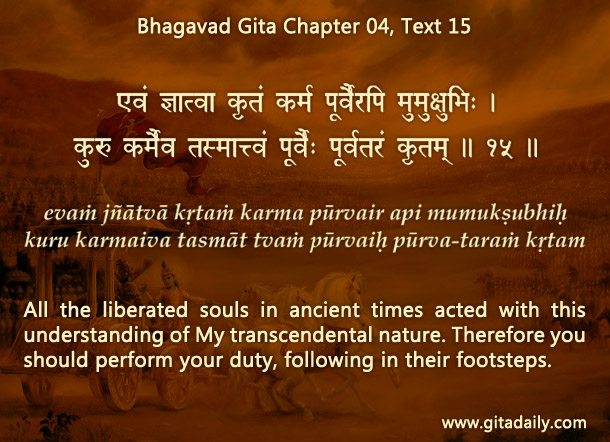Suppose somebody had sanctified their consciousness by bathing in a sacred river regularly at a particular place. This practice may have been going on for generations and giving up that practice may mean losing that opportunity for purification. However, if the river has changed its course and the place where our predecessors had bathed is now simply dry, then going there to bathe will be fruitless. Thus, continuing to do what was done in the past may defeat the purpose of what was done in the past.
When we think about being faithful to a tradition that we are following, we may believe that we need to keep doing literally all the things that were done in the tradition. That’s an understandable notion — the Bhagavad-gita (04.15) urges us to follow the path of the predecessors. Yet how to follow that path remains an enigma. Arjuna faced this challenge: did the path to liberation for him require renunciation of the world as done by sages or engagement with the world as done by various virtuous kings? Therefore, even following tradition requires choosing who in the tradition to follow — the renounced sages or the engaged kings.
Overall, more important than the path we follow is the purpose we pursue, as the territory may change over time. Therefore, rather than fanatically sticking to everything that was done in the past or cynically rejecting everything that was done in the past, we need to intelligently understand what was the purpose of what was done in the past and deliberate which action fulfills that purpose now and choose accordingly.
One-sentence summary:
We may drift from our mission by doing things different from what was done in the past but also by doing things the same way as were done in the past.
Think it over:
- Explain with an example how following a tradition literally may defeat the essential purpose of that tradition.
- How was following tradition not so straightforward even for Arjuna?
- How can we decide whether we are following tradition effectively?
***
04.15: All the liberated souls in ancient times acted with this understanding of My transcendental nature. Therefore you should perform your duty, following in their footsteps.
To know more about this verse, please click on the image


Hare Krishna!
PAMHO
Thank You very much. This is very helpful.
Ys,
Irena Tancheva
Happy to be of service.
Thank you for making us think in this direction.
What I understood was that, rather than getting confused or frustrated at the externals of practise of tradition – if I can know the purpose, the intent behind those actions done in the past and keeping the same purpose, if I can make my actions aligned to the same purpose in the present, then the application of principle becomes a dynamic experience. This is what makes spirituality real experience, else the tradition becomes merely a dry ritual. I have to choose my actions in line of the divine purpose.
Thank you very much.
Sound understanding and clear expression. Thanks.